On July 18 , Dr. Troy Grennan, physician lead for the Provincial HIV/STI program at the BC Centre for Disease Control, presented promising results from a pilot study on the effectiveness of using the antibiotic doxycycline to prevent sexually transmitted infections (STIs), ahead of the 2024 International AIDS Conference.
Dr. Grennan’s study is one of the first to look at doxycycline as a preventative tool for STIs, and showed a significant reduction in syphilis, chlamydia and gonorrhea among gay and bisexual men who have sex with men (gbMSM) living with HIV.
“DoxyPrEP led to an 80 per cent reduction in STIs overall,” said Dr. Grennan.
Doxycycline is an antibiotic that has been around since the 1960’s and is commonly used for a number of reasons, including as a long-term acne treatment and in malaria prevention. With rates of STIs increasing around the world and recent spikes in syphilis cases in B.C., Dr. Grennan and his colleagues are looking for new tools to help prevent the spread of infections. The province reported 2067 infectious syphilis cases in 2023, and there were over 15,000 cases of chlamydia, over 5,000 cases of gonorrhea and 186 new HIV diagnoses in B.C. that same year.
“This work builds on a literature that has existed for about a decade now on the use of doxycycline for STI prevention,” Dr. Grennan added. “But there’s a much smaller amount of literature on doxyPrEP.”
In the prevention and treatment space, doxycycline has proven to be an effective medication when taken after sexual contact and potential exposure to an STI. Taking it after being exposed is known as doxycycline post-exposure prophylaxis, or doxyPEP.
Doxy pre-exposure prophylaxis, or doxyPrEP, is when people who are engaging in sexual activity and at risk of contracting an STI take doxycycline every day to try to prevent infections altogether.
Dr. Grennan’s recent pilot trial followed 52 gbMSM living with HIV in Vancouver and Toronto who took either a daily dose of 100 mg of doxycycline or an identical placebo. Over the course of 48 weeks, the study produced similar results to another recent doxyPrEP study of HIV-negative gbMSM. In the group that was given doxycycline, chlamydia infections dropped by 92 per cent, syphilis infections by 79 per cent and gonorrhea by 68 per cent.
Given the small sample size the primary focus of the study was the feasibility of doxyPrEP, but the secondary outcomes proved to be quite interesting. Along with the dramatic drop in STIs, participants experience very few adverse effects, nearly 80 per cent of them took the medication through the full trial period, and there were no signals of concern that patients were developing resistance to antibiotics.
“It really does support the ongoing investigation of doxyPrEP as a tool for STI prevention,” said Dr. Grennan, explaining that this approach is another option for people who have been previously diagnosed with an STI, are sexually active and are frequently at risk of being exposed to infections.
To continue studying how doxycycline can be used to prevent and treat STIs, Dr. Grennan is running a larger, Canada-wide study called Doxycycline as an Intervention for bacterial STI ChemOprophylaxis, dubbed the DISCO project. Investigators involved in the DISCO trial are looking to recruit 560 participants in Vancouver, Calgary, Toronto, Hamilton, Ottawa and Montreal and will be comparing the effectiveness of doxyPrEP and doxyPEP.

Dr. Troy Grennan (2nd from right) is pictured with colleagues from the Online Sexual Health Services program, Public Health Laboratory and STI Clinic at BCCDC.
Dr. Grennan said one of the key issues in STI prevention and treatment is making sure patients are provided with all of the information they need to make their own choices and voice their opinions.
“We often make assumptions about our patients and what they prefer, but we need to ask them – some often prefer to take a daily pill,” he said. “It’s important to have conversations about the pros and the cons and the unknowns,” he said.
Dr. Grennan said he also wants to see STI prevention research move forward equitably, dedicating more effort toward key populations that haven’t received as much attention, such as cisgender women and young people.
He anticipates the results of the DISCO trial will be published in 2026.

